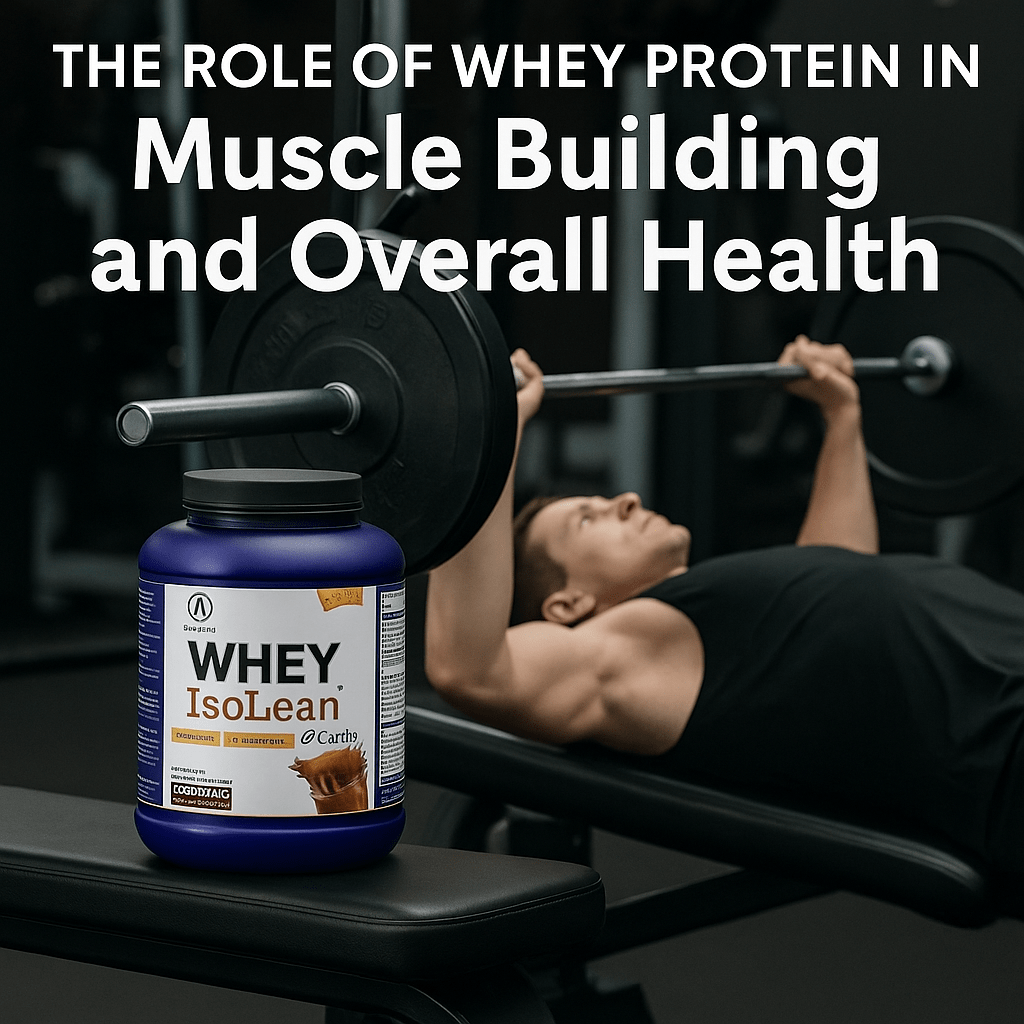In the world of fitness, health, and nutrition, whey protein is one of the most researched and trusted supplements available. But what exactly is whey protein, and how does it impact muscle growth and overall health?
Whether you’re a beginner starting your fitness journey or an athlete looking to optimize your recovery and performance, this guide explores the science-backed benefits of whey protein—from muscle building to immunity and weight management.
🔬 What Is Whey Protein?
Whey protein is a high-quality, complete protein derived from milk during the cheese-making process. When milk is coagulated, it separates into curds (casein) and whey. The liquid whey is then processed and dried into powder form to create whey protein supplements.
There are three primary types:
-
Whey Protein Concentrate (WPC) – ~70–80% protein
-
Whey Protein Isolate (WPI) – ~90–95% protein, minimal carbs and lactose
-
Whey Protein Hydrolysate (WPH) – Pre-digested, fast-absorbing
Among these, Whey Protein Isolate (WPI) is considered the purest and most effective form for muscle growth and overall health, especially for those following low-carb or lactose-sensitive diets.
💪 The Role of Whey Protein in Muscle Building
Whey protein is rich in essential amino acids, particularly branched-chain amino acids (BCAAs) like leucine, which is a key trigger for muscle protein synthesis (MPS).
How It Supports Muscle Growth:
-
Stimulates muscle repair: Leucine activates mTOR pathways, enhancing protein synthesis.
-
Boosts recovery: Reduces post-workout muscle soreness and accelerates repair.
-
Preserves lean mass: Supports muscle retention during calorie deficits or cutting phases.
-
Fast absorption: Perfect for the post-workout “anabolic window” (30–60 minutes after training).
💡 Tip: For optimal results, consume 20–30 grams of whey protein after workouts to maximize muscle repair and growth.
🏋️♀️ Benefits Beyond Muscle Growth
Whey protein isn’t just for bodybuilders—it offers a wide range of benefits that support general wellness, weight management, immune health, and more.
1. Weight Management & Fat Loss
-
Increases satiety (feeling of fullness)
-
Reduces hunger hormones like ghrelin
-
Helps preserve lean muscle while losing fat
Incorporating whey protein into meals or snacks can help curb cravings and reduce overall calorie intake, making it ideal for weight loss.
2. Metabolic Health
-
Improves insulin sensitivity
-
Supports stable blood sugar levels
-
Aids in managing type 2 diabetes
Whey protein, especially zero-carb isolates like Acacia Whey IsoLean™, is an excellent option for individuals on keto, low-carb, or diabetic-friendly diets.
3. Immune System Support
-
Rich in immunoglobulins, lactoferrin, and cysteine
-
Increases glutathione, a powerful antioxidant that strengthens immunity
4. Healthy Aging & Muscle Preservation
-
Prevents sarcopenia (age-related muscle loss)
-
Supports mobility, strength, and independence in older adults
Regular protein intake, including whey, is essential for maintaining muscle mass as you age.
🧪 Whey Protein vs. Other Proteins
| Feature | Whey Protein | Casein | Plant-Based | Egg White |
|---|---|---|---|---|
| Absorption Rate | Fast | Slow | Medium | Medium |
| Leucine Content | High | Moderate | Varies | High |
| Lactose | Low/None (Isolate) | Moderate | None | None |
| Ideal Use | Post-workout | Overnight | Daily | Daily |
While each protein type has its benefits, whey protein isolate is unmatched in terms of muscle-building efficiency and overall bioavailability.
🕒 When Should You Take Whey Protein?
| Timing | Purpose |
|---|---|
| Post-Workout | Accelerates muscle recovery and growth |
| Morning | Replenishes overnight muscle loss |
| Meal Replacement | Helps with weight loss and satiety |
| Before Bed (with Casein) | Prevents muscle breakdown during sleep |
🧍♂️ Who Should Use Whey Protein?
Whey protein is suitable for:
-
Athletes and gym-goers
-
Older adults preventing muscle loss
-
Busy professionals needing fast, healthy meals
-
Weight-loss seekers needing meal support
-
Low-carb or ketogenic diet followers
🧴 Choosing the Right Whey Protein
When selecting a whey protein supplement, consider the following:
| Feature | Look For |
|---|---|
| Protein per serving | 20–30g |
| Carbohydrates/sugar | 0–3g (for lean goals) |
| Leucine content | ~2.5g per serving |
| Additives | No artificial fillers, colors, or flavors |
| Certifications | Third-party tested for quality and purity |
✅ Top Recommendation:
Acacia Whey IsoLean™
-
25g protein per serving
-
Zero carbs, zero sugar, zero fillers
-
Gluten-free, lactose-free, and keto-friendly
-
Ideal for building lean muscle and supporting overall health
💬 Common Myths About Whey Protein
❌ Myth 1: “Too much protein is bad for your kidneys.”
✅ Fact: In healthy individuals, there is no evidence that high-protein diets damage kidneys.
❌ Myth 2: “Whey is only for bodybuilders.”
✅ Fact: Whey supports weight loss, immune health, aging, and more—it’s for everyone!
❌ Myth 3: “Natural food is better than whey.”
✅ Fact: Whey is a real food supplement—concentrated protein with high biological value.
📌 Final Thoughts: Is Whey Protein Worth It?
Absolutely. Whether your goal is to:
-
Build muscle
-
Lose fat
-
Improve health
-
Enhance recovery
-
Or support aging muscles
Whey protein is a safe, effective, and convenient solution. Especially when you choose a clean, zero-carb option like Acacia Whey IsoLean™, you’re getting unmatched quality and results.
🎯 Take Action: Fuel Your Body Right
Want to level up your health and fitness with the cleanest protein on the market?
✅ Try Acacia Whey IsoLean™ today — pure, powerful, and proven.



